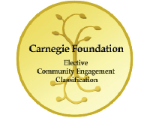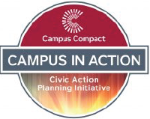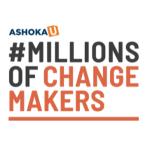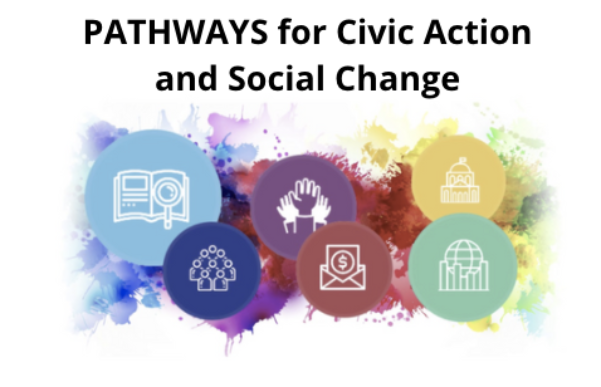For positive social change to occur, our communities rely on all of us engaging in multiple ways, along various pathways. This positive change creates conditions, access, and opportunities for everyone to have enough of what they need to thrive, which in turn creates healthier, more vibrant, equitable, and sustainable communities.
The Pathways for Civic Action and Social Change describe a range of possibilities by which we can be civically engaged in our communities and create social change, regardless of career/field of interest. We need people working within all of these pathways to create change, however one person does not need to be involved with each path - it's all about finding what you're interested in, or have knowledge and expertise in. You can also be involved in as many paths as you would like.
How will you work for a just, fair, and inclusive society?
Students have the opportunity to take a survey to help them identify their preferred strategies for creating change, and can meet with a Community Engagement Peer to discuss their results and get connected to the community.
Click here to see examples of how you can use the Pathways to create social change around specific social issues, with examples of how to get involved here at Drake and in the local Des Moines Community.
Hear from Drake students how they've been active in specific pathways.
The six pathways are:
Community Engaged Learning and Research
Community Engaged Learning and Research: Connecting coursework and academic research to community-identified concerns to enrich knowledge and inform action on social issues.
- Take college classes that allow you to connect your field with community issues and see real-world applications of what you are learning (i.e. service learning). At Drake, search for the CEL attribute when searching for classes.
- Conduct research to further investigate how your organization can positively impact the community
- Review existing publications and research, and learn more about the community issues, priorities, and initiatives that you are passionate about
- Participate in a community-engaged internship or research experience
- Partner with local agencies to help survey or interview residents for community-based initiatives or services
Hear from Drake student CJ Younger about her experience with Community Engaged Learning & Research
Community Organizing and Activism
Community Organizing and Activism: Involving, educating, and mobilizing individual or collective action to influence or persuade others.
- Join an activism or community organizing committee such as SURJ (Showing Up for Racial Justice)
- Attend a single-day demonstration or rally (know your rights and stay safe)
- Participate in sustained, long-term protests
- Create art as a form of protest
- Avoid a product, company, or service as a form of protest (boycott)
- Lead or spread the word about a boycott of a product, company, or service
- Sign or start a petition about a cause you care about
- Use social media to promote a cause or pressing community need
- Spark a discussion with people about a form of activism or topic you are passionate about
- Visit Drake Student Senate office hours to express concerns about an issue facing students
Direct Service
Direct Service: Working to address the immediate needs of individuals or a community, often involving contact with the people or places being served.
- Volunteer with a non-profit around a cause that you are interested in. Examples include stocking food at a food pantry, serving meals at a homeless shelter, restoring trails at a local park
- Participate in a sustained volunteer opportunity such as tutoring or mentoring youth
- Participate in a National Day of Service or another one-time service event
- Join the board of a non-profit or community agency
- Participate in a service year program like AmeriCorps, Peace Corps, City Year, etc.
- Join a student organization such as Drake's Habitat for Humanity chapter, Next Course Food Recovery, or APO
- Find volunteer opportunities at www.drake.edu/dugood.
Hear from Drake student Matthew Williams about his experience with Direct Service
Philanthropy
Philanthropy: Donating or using private funds or charitable contributions from individuals or institutions to contribute to the public good.
- Show generosity through the gift of your time, talent, and treasure
- Donate personal funds to an organization or cause you care about
- Run or participate in a fundraising activity for a non-profit organization
- Collect donations from others for an organization or cause you care about
- Collect or donate goods, like canned foods or personal hygiene items and donate them to the Little Free Pantries or a local food bank
- Use social media platforms and other outlets to raise awareness of philanthropy efforts being spearheaded by other individuals or organizations
- Donate blood
- Join a philanthropic student organization at Drake, such as Student Alumni Association or Dance Marathon.
Hear from Drake student Liza Vinyon, who shares about her experiences with philanthropy at Drake.
Policy and Governance
Policy and Governance: Participating in political processes, policymaking, and public governance.
- Vote (including in local, off-year elections)
- Register others to vote
- Complete the Census
- Volunteer as a poll worker on Election Day
- Write to and/or call elected officials to present opinion on public issues (find your legislators at https://www.usa.gov/elected-officials). Tips for reaching out to your legislators on issues you care about. Email/Letter Template
- Attend a city council or government commission meeting. City Council Meeting Reflection handout.
- Attend a school board meeting
- Participate in student government
- Join the executive council of your residence hall association
- Join a government commission or advisory group
- Join a local school or policy advisory group
- Run for public office
- Contribute to public, written comments on pending legislation (federal, state, and/or local)
- Speak directly to legislators at the Capitol
- Contact media to present your opinion on public issues
- Write an editorial in your local newspaper like the Drake Political Review or Times Delphic
- Research or learn about policies within a topic of interest or organization you are a member of
- Read up on how to have civil dialogue - Civic Dialogue Resources (articles, podcasts, and documentaries)
Hear from Drake student Mel Sadecki, who shares about her experience with policy & governance while at Drake.
Social Entrepreneurship and Corporate Social Responsibility
Social Entrepreneurship and Corporate Social Responsibility: Using ethical business or private sector approaches to create or expand market-oriented responses to social or environmental problems.
- Join a social entrepreneurship focused group, working on projects like helping teenagers interested in entrepreneurship to start small businesses
- Get involved with the Lorentzen Hatchery at Drake which is aimed at fostering student startups.
- Only purchase fair trade products and encourage others to do the same, with the goal of pressuring other businesses to also adopt fair trade.
- Start a student-managed investment fund that invests only in socially responsible businesses.
- Design a mobile app that helps urban residents donate to services that support people experiencing homelessness, with a small percentage fee.
- Ask to set up a meeting with the Sustainability Coordinator at Drake, Sophia Seigel, to partner in creating sustainable events and practices within your organization
- Create sustainable partnerships and collaborations with other people and organizations
- Brainstorm new business ideas and road map out your best idea to create change within that sector
Used with permission from Haas Center for Public Service, Stanford University
Contact us!
The Office of Community Engaged Learning would love to speak to your class or student organization about the Pathways for Civic Action & Social Change. We can cater to your specific goals and needs. Reach out to mallary.allen@drake.edu.
Careers in Social Change Panel Series
We have held a series of virtual career panels with professionals working in fields tied to the Pathways. You can view recordings from these panels here.










